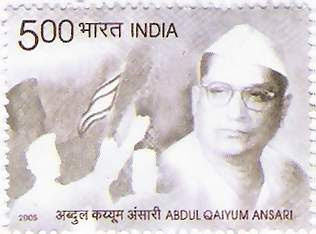Urdu press and India's freedom struggle
 The history of India's Independence will be incomplete without the mention of the role played by Urdu poets/journalists. Unfortunately, not much attention has been given to the subject except reasearch and discussions in academic and scholarly circles.Urdu's identity , at least in
The history of India's Independence will be incomplete without the mention of the role played by Urdu poets/journalists. Unfortunately, not much attention has been given to the subject except reasearch and discussions in academic and scholarly circles.Urdu's identity , at least in While interest in personalities like Ghalib, Zauq, Meer and other Urdu poets has always been there (some believe it has even increased) the valour and sacrifices of people like Maulvi Mohammed Baqar, Muneer Shikohabadi, Munshi Sajjad Hussain and Brij Narayan Chakbast are hardly heard and remembered.
Some personalities like Maulana Abul Kalam Azad, Hasrat Mohani, Mohammed Ali and others are remembered more for their political activities that overshadows the work they did with the pen. Their prominence and fame had a lot to do with the fact that their publications were loved by the masses that catapulted them in the public domain.
Another name that comes to mind is that of Abdul Qaiyum Ansari in
Maulvi Mohammed Baqar the editor of Urdu Akhbar was a contemporary of Ghalib. Baqar had taken upon himself to keep up the morale of the
Candid and fortright in his comments and reports, the British very soon realised the harm he was doing to their interest. William Dalrymple's The Last Mughal gives a vivid picture of the man and his mission. Maulvi Baqar's Urdu Akhbar was not a mouthpiece for the rebels, but like any nationalist of the time he opposed the Britishers. Under the most trying circumstances, Baqar continued to bring out his paper and earned the ire of the Britishers.
Baqar was shot dead after the Britishers took over
Muneer Shikohabadi, a poet based in Farrukhabad was arrested, tortured and sent to the Andamans for his nationalist views and fanning anti-British opinion. Not much is known about Shikohabadi and he has been reduced to a footnote in the annals of history. However, his poems give an account of the situation in
As the government of the day responded quickly and forcefully against the unyielding Urdu press some revolutionaries started printing newspapers outside
The committee also mentioned Raja Mahendra Pratap Singh and Maulana Obaidullah Sindhi who 'used Urdu for the propagataion of their ideas and produced a rich volume of political literature'.
The Awadh Punch, started under the editorship of Munshi Sajjad Hussain in 1877, took Urdu satire to new levels. It poked fun at the British administration and joined cause with the Congress. Using humour it also worked to forge Hindu-Muslim unity.
Chakbast (pic left), a Kashmiri Brahmin died when he was only in his 40s. A lawyer by profession he was a gifted poet and writer. His hilarious poem 'Lord Curzon Se Ek Jhapat' describes a fictitious conversation between Chakbast and Lord Curzon. A daring and fearless piece of work, 'Lord Curzon Se Ek Jahpat' was well ahead of its time.
The Mumbai-based popular Urdu daily Inquilab was founded by Abdul Hamid Ansari in 1938. A staunch Congressman, Ansari's newspaper espoused nationalist causes. After Partition, Jinnah invited him to


WONDERFUL! Keep it on
ReplyDeleteThank You for this insight! Beautiful website! Please keep us informed and educated about Muslims' contributions on India's freedom!
ReplyDeleteInteresting read
ReplyDeleteThank you for your comments. It would be nice if you could include your names along with your comments.
ReplyDeleteMy best compliments for your thoughtful and knowledgeable piece of writing. Keep it up.
ReplyDeleteGood one.thanks for bringing out such information which have been loosening their relevance due to neglect and linguistic barriers.
ReplyDelete.informative
ReplyDelete